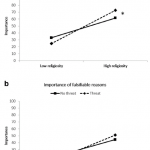 Another year over, and one which saw this blog move to a new home here on Patheos. Welcome to any new readers out there, and let’s get stuck in to the annual round up of the stories from 2014!
Another year over, and one which saw this blog move to a new home here on Patheos. Welcome to any new readers out there, and let’s get stuck in to the annual round up of the stories from 2014!
There was some great research published this year on why people turn to religion (or turn away from it). We learned that people who suffer migraines are more likely to become religious (Do migraines cause religion?) – perhaps because chronic pain in general intensifies religious feelings.
In a similar vein, a study found that cultures that develop in tough climates are more likely to believe in moralizing gods (Hard times, tough gods), perhaps because, faced with an uncertain world, these cultures need a supernatural policeman to encourage co-operation.
There were a few studies this year on Agency Detection – the tendency that we humans have to see faces, people, and minds at work behind random patterns and events. A brain-scanning study found that, when supernatural believers watch images of geometric shapes moving randomly, the areas of their brain linked to mentalising other minds become activated (Supernatural believers see minds at work behind random patterns). Experiencing something wondrous can sensitise people to detect agents (Turning to God for reassurance in the face of wonder), but simply thinking about ghosts does not (When you think about spirits, do you see ghosts?)
In earlier years, we’ve seen plenty of evidence that educated, intelligent people tend to be less religious. But is it the education or the intelligence that’s driving this?
Well, one study found that access to the internet has an important role in the loss of religion among the young (Is the internet leading people away from religion?). Another found that, although religious and paranormal believers are high in empathy, they are confused about how the world works. And we also learned that, although atheism is linked to higher intelligence, it doesn’t protect against cognitive decline.
Of course, upbringing has a major influence on beliefs. For example, one controversial study concluded that children with a religious upbringing have difficulty telling fantasy from reality, while another found that religion matters more than education when it comes to creationist beliefs. Part of the attraction of religion is that all kinds of unfalsifiable beliefs – not just religious ones, are attractive by their very nature.
And religion seems to change the things that people find disgusting – they’re less disgusted by contamination, but more disgusted by things that remind us of our animal nature. I guess they want to believe themselves to be closer to angels.
Religious people do tend to be happier (and healthier), but the magnitude of the effect varies in different countries around the world. It appears only to be true in countries where there is freedom of religion, and many people are religious. Religion does seem to reduce the risk of suicide, although this might simply be because many religions strongly condemn suicide, rather than because they make people happy. And while religious people have more friends, this seems to be simply because sociable people are attracted to religion. What’s more, believing in hell seems to make people unhappy.
Religious people tend to say they are better behaved – although it depends on the country, and maybe depends on how honest people are with themselves. Similarly, troubled teenagers who become religious later report committing fewer crimes, evidence perhaps of a causal relationship. The situation plays a role too, as hearing the Islamic call to prayer encourages Muslims to cheat less. However, all of this sits uncomfortably with the fact that religious countries are the most corrupt.
In a sad nod to the divisions created by belief and non-belief, a study of Chinese believers and atheists found that atheists and Christians don’t feel each others pain, although atheists seem to be able to overcome this urge – at least in China.
On the other hand, it seems that prayer can improve your self-control. Strangely, this works just as well for atheists as it does for believers -probably because it’s the act of pausing for reflection that’s important.
Which is a nice thought to take forward into the New Year, when you’re finding it a struggle to stick to all your resolutions.
In case you missed it, this year I also wrote a Best of Epiphenom 2007-2014 post. And of course there are also all the annual reviews from previous years: 2013, 2012, 2011, 2010, and 2009.
Happy New Year Everyone!















